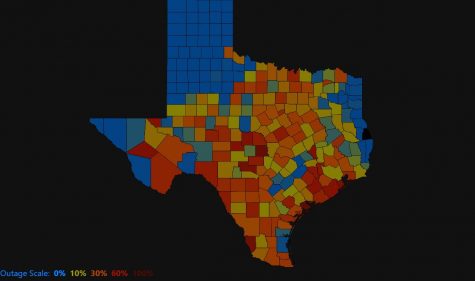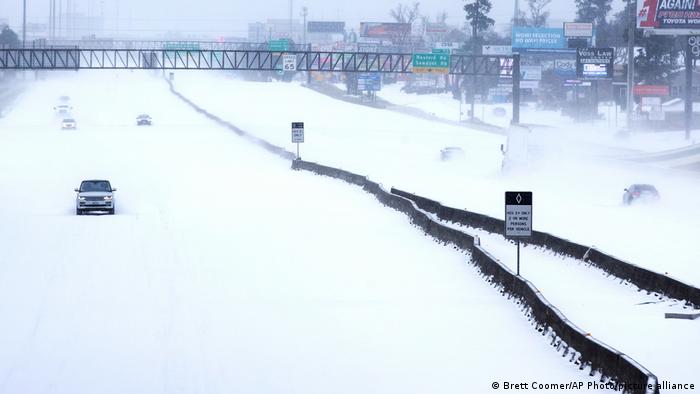Texas Winter Catastrophe Continues
Grant Williams called it nothing less than living in hell.
Williams, a resident of Spring, Texas, called the winter storm and electric blackout, “a frozen hell that was bound to happen.” Williams and his family lost power for over 48 hours and then experienced rolling blackouts for an additional 24 hours. He was just one of 10 million who lost electricity.
He is also one of the many Texans who are trying to recover from a winter catastrophe including black ice, power outages, and astronomically high electric bills.
Texas is the only state that uses its own power grid. How did a state who prides itself on independence have the most significant power failure ever? The Electric Reliability Council of Texas, ERCOT, was formed in 1970 to preserve costs. ERCOT was appointed to facilitate power flows and utilities.
Houses in Texas are not designed to keep heat in due to the extreme summer temperatures, residents explaned to The Impact. Texas also has a massive demand for electricity and natural gas, so there wasn’t enough to go around to homes and power plants. Additionally, to make matters worse, many natural gas wells in the western part of the state froze, meaning they couldn’t push gas through them. So both of these power sources were being forced to extreme measures causing them both to fail and Texans to suffer the consequences.

Williams first thought the snowstorm would be an exciting time for him, his wife, and his 3-year-old daughter, Jasmine. The family had never experienced a snowstorm, like many others in Texas.
“I was so excited for Jasmine. The first day, before the outage, we just played outside all day. Then it hit.”
Many Texans were forced to relocate due to unlivable conditions. Some homes reached below 40 degrees. Williams decided to stick it out at home – after all, ERCOT initially reported the blackout would only last 15 minutes.
And then, 50 hours passed.
“After I woke up the second day, I was seriously scared for my family. So I packed up my girls and drove three hours to my parent’s house. Luckily, they had heat and power. I don’t know what I would’ve done if I didn’t have them to go to.”
The fun snow day for Texans quickly transformed into an act of survival.
Spencer Muskopf, a resident of Denton, Texas, experienced a power blackout for 52 hours straight. Then he saw a tweet notifying his county of a “boil water notice,” meaning that the water was unsafe for consumption. No officials reached out to him, sent an email or a local alert- leaving residents on their own to find this information.
“I feel abandoned by state officials in this whole situation. No one was updating me during the outages and then again with the water notice. What if I would have consumed it?”
Muskopf’s power eventually turned back on after rolling blackouts, but the boil water notice continued for 48 hours.
“I’m thankful I saw the notice. What about those who don’t have access to news stations or social media? What about them?”
Muskopf noted that The University of North Texas rallied together funds and provided hot meals, power, and internet services to those in need. Nearly 1,000 people were able to be helped.
Muskopf concluded his thoughts by saying, “It’s really the community that rallied together. We had no help or guidance from any local officials – it’s just the neighbors sticking together and helping one another.”
The power outages were followed by a deadly pileup earlier that week on I-35, a major highway used by the entire state for every day and cargo transportation. The crash was ignited by black ice. Videos surfaced online of semi’s plowing into piles of cars. The pileup consisted of 133 cars and resulted in six deaths.

Texas was not prepared for this storm by any means. At least 16 people died from the harsh freezing conditions. On top of all of this, many Texans were charged an ample amount on their electric bills—some reporting of up to tens of thousands of dollars.
This is the result of an unregulated energy market. This allows customers to choose which local provider to do business with, but it also means that when demands increase, so does the price. When the power crisis hit Texas, the state’s Public Utilities Commission ordered the price cap to raise to its maximum level of $9 per kilowatt-hour.
This pushed most customers to have daily costs of over $100 and sometimes even 50 times the average price.
The ERCOT CEO, Bill Magness, was fired on Wednesday.
This story is still developing.

Casey Akers is a senior at Mercy College. Casey is a captain on the softball team and a member of the Maverick Standing Together group. She is majoring...








